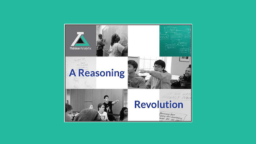Logical thinking, the ability to analyze a problem and come up with a rational solution, is crucial for student success. You need it for mathematics and computer science, to name just two obvious academic subjects, but the reality is that you can’t do well in school (and through life) without the ability to reason logically.
Now, with ThinkerAnalytix, an educational nonprofit developed by professors and graduate students from Harvard University, students everywhere can learn to hone their logical reasoning skills from the comfort of their own room.
ThinkerAnalytix started In 2014 when a group of professors and graduate students from the department of Philosophy at Harvard taught a pre-college ethics course to local middle and high school students.
When they observed that the students struggled with discussing ethical issues because of their lack of logical reasoning skills, the educators implemented a simple, but powerful. method called argument mapping, which proved hugely effective.
Currently, with trained cohorts of instructional coaches, ThinkerAnalytix partners with more than 70 universities and middle and high schools and continues to provide digital resources on critical thinking to thousands of students free of charge.
The organization also has programs for educators who want to help their students sharpen their logical thinking skills. How We Argue, a graduate-level course with one credit conferred by SNHU, is meant for educators who want to help their students write better essays and have more constructive discussions. The Instructional Coach Program is for educators who want to help their students develop critical thinking skills by exploring the power of argument mapping.
How ThinkerAnalytix’s Argument Mapping Develops Logical Reasoning
ThinkerAnalytix’s mastery learning course on critical thinking, How We Argue teaches students the method of argument mapping, a well-established, research-backed logical reasoning tool to visually construct and analyze arguments.
By literally mapping out their arguments, students can physically trace reasons for their claims, recognize plausible objections and expose hidden assumptions.
Each lesson is broken down into small chunks, such as short videos or practice exercises, so that students can work through it at their own pace. On average, the entire course takes about 5-8 hours to complete.
In short, you can think of the course as a “boot camp for arguments.” After hours of “logic muscles” put into use, argument mapping will feel like second nature.
If you’re looking for something a bit lighter, start with trying out their weekly argument-mapping games on various topics, spanning from light-hearted ones like whether cereal is or is not a soup to ones with higher stakes like critical race theory and police funding.
Why Students Should Learn Argument Mapping
Argument mapping may help students position themselves for success.
If you’ve ever taken or prepared to take any standardized tests, you should be familiar with one key skill — logical reasoning. Whether it’s the SAT, the LSAT, the GRE or the GMAT, most standardized tests aim to assess one’s ability to reason logically. And argument mapping may help you with any of these standardized tests.
Argument mapping may also help you if you want to improve your debate skills, you are a part of Model UN programs or you are a member of the National High School Ethics Bowl, for example.
Follow ThinkerAnalytix on TUN
Students and educators can also follow ThinkerAnalytix on TUN to get news and learn about new argument mapping games and upcoming courses!



